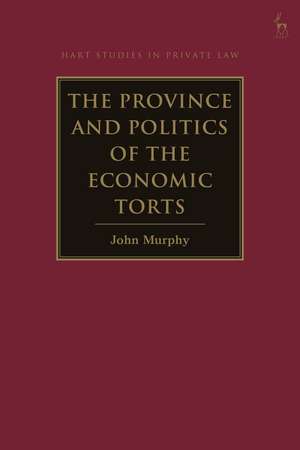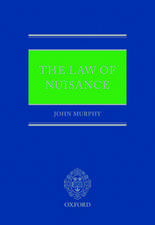The Province and Politics of the Economic Torts: Hart Studies in Private Law
Autor John Murphyen Limba Engleză Paperback – 14 iun 2023
| Toate formatele și edițiile | Preț | Express |
|---|---|---|
| Paperback (1) | 299.96 lei 6-8 săpt. | |
| Bloomsbury Publishing – 14 iun 2023 | 299.96 lei 6-8 săpt. | |
| Hardback (1) | 541.77 lei 6-8 săpt. | +117.46 lei 7-13 zile |
| Bloomsbury Publishing – 23 feb 2022 | 541.77 lei 6-8 săpt. | +117.46 lei 7-13 zile |
Din seria Hart Studies in Private Law
- 28%
 Preț: 498.73 lei
Preț: 498.73 lei - 30%
 Preț: 1129.41 lei
Preț: 1129.41 lei - 30%
 Preț: 509.60 lei
Preț: 509.60 lei - 22%
 Preț: 238.22 lei
Preț: 238.22 lei -
 Preț: 217.53 lei
Preț: 217.53 lei - 28%
 Preț: 374.46 lei
Preț: 374.46 lei - 22%
 Preț: 237.66 lei
Preț: 237.66 lei - 28%
 Preț: 437.06 lei
Preț: 437.06 lei - 30%
 Preț: 601.04 lei
Preț: 601.04 lei - 28%
 Preț: 436.15 lei
Preț: 436.15 lei - 26%
 Preț: 602.11 lei
Preț: 602.11 lei - 18%
 Preț: 302.52 lei
Preț: 302.52 lei - 22%
 Preț: 258.42 lei
Preț: 258.42 lei - 22%
 Preț: 225.06 lei
Preț: 225.06 lei - 30%
 Preț: 569.60 lei
Preț: 569.60 lei - 30%
 Preț: 600.06 lei
Preț: 600.06 lei - 30%
 Preț: 598.45 lei
Preț: 598.45 lei - 18%
 Preț: 322.23 lei
Preț: 322.23 lei - 28%
 Preț: 498.16 lei
Preț: 498.16 lei - 18%
 Preț: 320.53 lei
Preț: 320.53 lei - 30%
 Preț: 601.29 lei
Preț: 601.29 lei - 30%
 Preț: 541.54 lei
Preț: 541.54 lei - 30%
 Preț: 570.99 lei
Preț: 570.99 lei - 22%
 Preț: 261.64 lei
Preț: 261.64 lei - 30%
 Preț: 540.38 lei
Preț: 540.38 lei - 30%
 Preț: 838.22 lei
Preț: 838.22 lei - 30%
 Preț: 541.38 lei
Preț: 541.38 lei - 18%
 Preț: 357.83 lei
Preț: 357.83 lei - 22%
 Preț: 232.54 lei
Preț: 232.54 lei - 30%
 Preț: 774.86 lei
Preț: 774.86 lei - 22%
 Preț: 269.76 lei
Preț: 269.76 lei - 30%
 Preț: 719.33 lei
Preț: 719.33 lei - 30%
 Preț: 774.28 lei
Preț: 774.28 lei - 18%
 Preț: 322.05 lei
Preț: 322.05 lei - 22%
 Preț: 776.24 lei
Preț: 776.24 lei - 27%
 Preț: 409.73 lei
Preț: 409.73 lei - 30%
 Preț: 569.37 lei
Preț: 569.37 lei - 30%
 Preț: 514.01 lei
Preț: 514.01 lei - 30%
 Preț: 544.05 lei
Preț: 544.05 lei
Preț: 299.96 lei
Preț vechi: 365.96 lei
-18% Nou
Puncte Express: 450
Preț estimativ în valută:
57.40€ • 59.57$ • 47.98£
57.40€ • 59.57$ • 47.98£
Carte tipărită la comandă
Livrare economică 15-29 martie
Preluare comenzi: 021 569.72.76
Specificații
ISBN-13: 9781509955480
ISBN-10: 1509955488
Pagini: 320
Dimensiuni: 156 x 234 x 25 mm
Greutate: 0.45 kg
Editura: Bloomsbury Publishing
Colecția Hart Publishing
Seria Hart Studies in Private Law
Locul publicării:London, United Kingdom
ISBN-10: 1509955488
Pagini: 320
Dimensiuni: 156 x 234 x 25 mm
Greutate: 0.45 kg
Editura: Bloomsbury Publishing
Colecția Hart Publishing
Seria Hart Studies in Private Law
Locul publicării:London, United Kingdom
Caracteristici
Offers a unique perspective on an oft discussed area of private law
Notă biografică
John Murphy is Professor of Law at the University of Lancaster, UK.
Cuprins
1. Introduction I. Identifying 'The Economic Torts' A. One Major Problem B. The Major Problem in Historical Perspective II. The Actions Dealt with in this Book III. Aims and Theses IV. Structure of the Book 2. The Mistake of Monism I. Introduction II. Leading Monistic Accounts III. The Limitations of Monism A. The Conventional View B. The Rights-Based View C. The Kantian View IV. Conclusion 3. Inducing Breach of Contract I. An Inexplicable Action? A. Attempted Rationales B. An Alternative View II. An Action Protecting Purely Economic Interests? A. A Lesson from 'Status-Based' Theory B. A Lesson from the 'Property Thesis' C. A Lesson from 'Accessory (or Secondary) Liability Theory'III. Conclusion 4. Torts Requiring Unlawful Means I. Introduction II. Causing Loss by Unlawful Means A. The Conventional View on Scope B. Challenges to the Conventional View on ScopeC. The Rationale of the Unlawful Means Tort III. Unlawful Means Conspiracy A. Distinctiveness of the Tort B. Scope and Potential of Unlawful Means Conspiracy IV. Conclusion 5. Lawful Means Conspiracy and Intimidation 2I. Lawful Means ConspiracyA. Vitality B. Rationale C. Merits D. Potential E. Reservations F. Final Remarks II. Two-Party Intimidation A. Introduction B. Vitality C. Gist D. Merits and Potential E. Other Reservations F. Final Remarks 6. The Misrepresentation Torts I. Introduction II. Passing Off A. Protected Interest B. The Relevance of Reprehensible Conduct C. The Future D. Final Remarks III. Injurious Falsehood A. Vitality B. Protected Interests C. The Need for Malice D. Future Prospects E. Final Remarks IV. Deceit A. Protected Interests B. Egregious Wrongdoing C. Final Remarks V. Conclusion 7. Connections and Distinctions I. Monism Revisited II. Juridical Links and Distinctions A. Mental Elements B. Unlawful Means C. Conclusion on Juridical Links and Distinctions III. Structural Links and Distinctions IV. Functional Links and Distinctions A. Torts Protecting a Range of Interests B. Torts with a Clear Alternative Rationale C. Conclusion on Functional Distinctions V. Overall Conclusion 8. Genesis and Evolution I. Introduction II. ZeitgeistIII. Politics A. The Commitment to Individualism B. Faith in Competitive Markets C. Judicial Hostility Towards Trade Unions 3IV. The Influence of Juristic Literature V. Especially Reprehensible Defendants VI. Conclusion 9. Future Province of the Economic Torts I. Introduction II. The Future of the Economic Torts A. The Legitimacy of Judicial Gap-Filling B. Constraints on, and Justifications for, Judicial Innovation III. Interpretivism or Wishful Thinking? IV. Conclusion

















